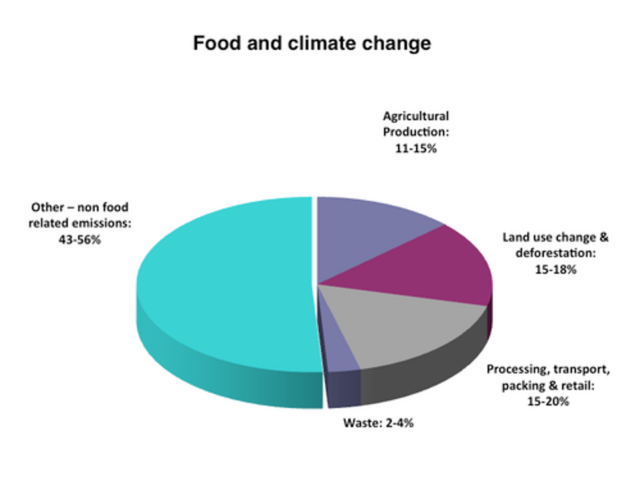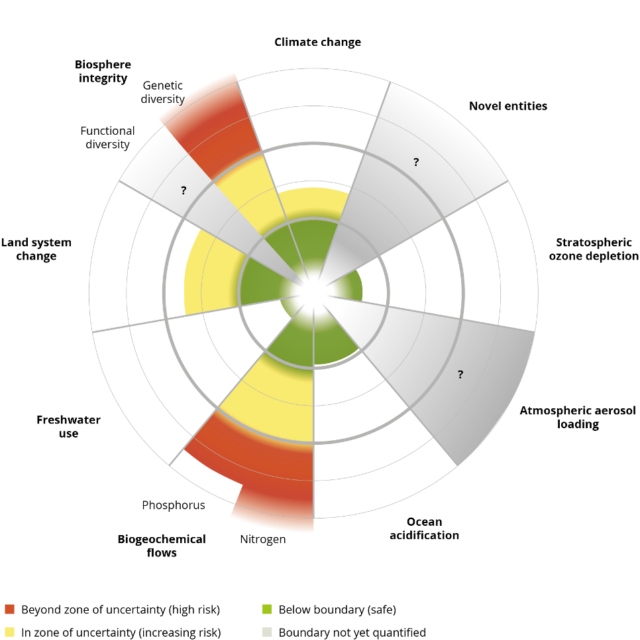Soil Not Oil: Transforming the Industrial Fossil Fuel Food System into Fossil Fuel Free, Biodiverse, Regenerative Food Systems
TRANSCEND MEMBERS, 23 Oct 2023
Prof. Vandana Shiva | Navdanya International – TRANSCEND Media Service
13 Oct 2023 – Industrial Agriculture Is Rupturing the Planetary Boundaries and Driving Climate Change – How living soil teeming with microbes and fungi can mitigate climate change and increase nutrition, just as Earth’s ecology regulated climate over billions of years. Working with nature to address environmental ills.
Fossil agriculture and food systems are destroying the climate, biodiversity and our health. More than 50% of the greenhouse gas emissions come from an industrial fossil food system of producing, processing, distributing food.
Industrial agriculture and its food systems are fossil fuel systems. The fossil fuel chemicals like nitrogen fertilizers have disrupted the planetary nitrogen boundary. The monocultures promoted for fossil fuel inputs are driving loss of biodiversity and genetic diversity, and species extinction.
Fossil agrichemicals on which industrial food systems are based are driving plants, insects, and birds to extinction. Synthetic fertilizers kill soil organisms, pesticides and insecticides kill insects, herbicides kill plants.
Rachel Carson claimed that at the heart of our motivation to introduce poisons into the environment lies a deeply held and outdated philosophy—one that could ultimately lead to our undoing: “The ‘control of nature’ is a phrase conceived in arrogance, born of the Neanderthal age of biology and philosophy when it was supposed that nature exists for the convenience of man.”
According to the submissions to the Plant Genetic Resources conference in Leipzig in 1995, 75% plant biodiversity in agriculture had been lost due to industrial monocultures.
A recent German study shows, 75% of insects have disappeared. Another study from France has called the disappearance of birds in France as a biodiversity oblivion.
Pesticide and fertilizer use has been linked to the decline in European bird populations, a study has found. There are around 800 million fewer birds in Europe now than 40 years ago, a drop of 25%. But in wild farmland birds, which rely on insects for food, the decline is 60%.
BirdLife International’s authoritative report, State of the World’s Birds 2022, estimates that there are now nearly three billion fewer wild birds in Canada and the U.S. than a few decades ago,
Researchers found that increased farm sizes resulted in a 15 per cent decline in bird diversity.
According to the International Energy Agency: “Oil use as a petrochemical feedstock is the only area to see an increase in demand.” As the IPCC notes in a 2019 report on climate change and land, nitrogen fertilizer production has increased nearly ninefold since 1961, reaching a staggering 123 million tonnes in 2020. Fossil fuel fertilizers contribute to a greenhouse gas that is 2300 times more damaging to the Climate than CO2.
Fossil Fuel Free Biodiverse Regenerative Food Systems for Real Solutions to Climate Change
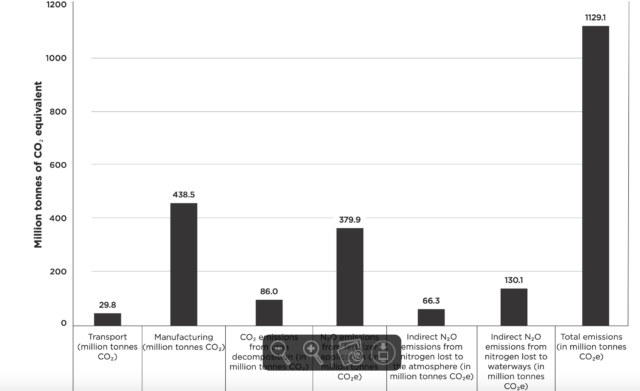
Image: Global Lifecycle GHG Emissions from Nitrogen Fertilizer The emissions from the full life cycle of chemical fertilizers are 1.1 Billion tonnes equivalent of CO2. Source: https://www.ciel.org/wp-content/uploads/2022/10/Fossils-Fertilizers-and-False-Solutions.pdf
Fossil fuel free, biodiversity-based regenerative organic agriculture maximises photosynthesis, nature’s technology of carbon capture which also produces food and oxygen. It is nature’s technology that regulates climate and has cooled the planet for over 4 billion years.
Biodiversity-based organic farming which intensifies photosynthesis is a climate and food solution
Through her self organisation and self regulation, the living Earth and her biodiversity reduced the carbon rich atmosphere of the planet from 4000 ppm to 250 ppm, from 98% CO2 to 0.03% CO2. The Earth reduced her temperature from 290 degrees without life to 13 degrees with biodiversity.
Working according to Nature’s ecological laws, intensifying biodiversity, regenerating the soil with fossil agrichemical free organic farming can close the emissions gap and contribute to negative emissions by drawing down CO2 from the air and putting it in the plants and soil, growing abundant food while addressing the climate problem.
As Andre Leu concludes on the basis of scientific evidence, the different system of photosynthesis maximization and returning carbon to the soil, “could sequester 34.74 Gt of CO2 per year. This is more than the current anthropogenic emissions of 26.88 Gt of CO2 eq per year and would achieve negative emissions. […] Scaling up regeneration on 10% farms can significantly contribute to achieving the negative emissions needed to limit global warming to 1.5°C higher than pre-industrial levels.”
Dr. Jacqueline McGlade also affirms that ecological techniques that return living 1% carbon to half the world’s agricultural soils would be enough to absorb about 31 gigatonnes of carbon dioxide of CO2 per year, which is 32 gigatonnes gap between planned emissions reduction and what is needed to be reduced by 2030 to meet the 1.5 C target.
Organic soils are rich in mycorrhizal fungi which bring nutrients to the plants, while plants give them carbohydrates as food. The symbiotic relationship between plants and fungi is the basis of our food system. It also holds the secret of how soil holds the answer to problems created by oil . Global plant communities contribute 13.12 Gt CO2 to diverse species of mycorrhizal fungi, which is approximately 36% of current CO2 emissions from fossil fuels. Chemical-free soils rich in microorganisms and mycorrhizal fungi also increase the nutrition in food.
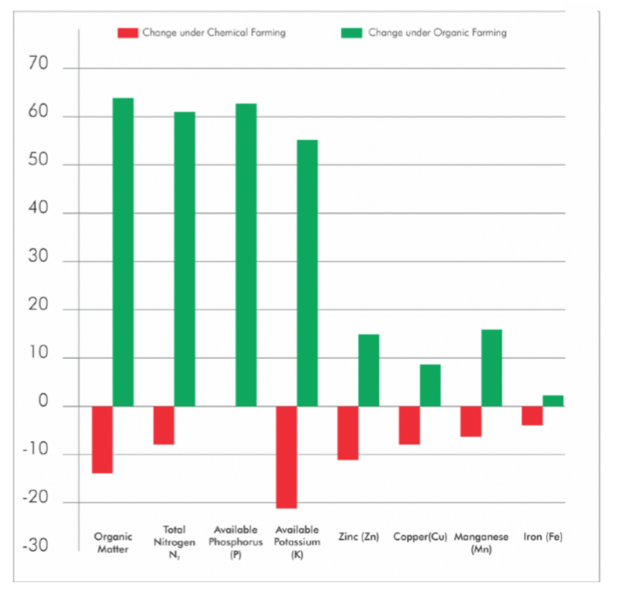
Image: Soil nutrition available to plants, and nutrition in our food. Soil Nutrition in Organic vs Chemical Farms
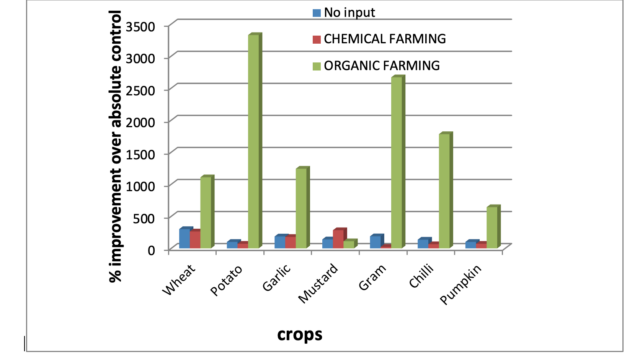
Source: https://medcraveonline.com/HIJ/a-comparison-on-soil-biological-health-on-continuous-organic-and-inorganic-farming.html Image: Fungi on Organic vs Chemical Farms
Regenerating the soil is the most effective way to grow more food and address climate change. Soil not Oil is the path to the future. Soil is the answer to problems that the Age of Oil has created. When the world is on the boil, turn to the Soil.
_______________________________________________
Based on forthcoming book, Climate Change and the Future of Food.
 TRANSCEND Member Prof. Vandana Shiva is a physicist, ecofeminist, philosopher, activist, and author of more than 20 books and 500 papers. She is the founder of the Research Foundation for Science, Technology and Ecology, and has campaigned for biodiversity, conservation and farmers’ rights, winning the Right Livelihood Award [Alternative Nobel Prize] in 1993. She is executive director of the Navdanya Trust.
TRANSCEND Member Prof. Vandana Shiva is a physicist, ecofeminist, philosopher, activist, and author of more than 20 books and 500 papers. She is the founder of the Research Foundation for Science, Technology and Ecology, and has campaigned for biodiversity, conservation and farmers’ rights, winning the Right Livelihood Award [Alternative Nobel Prize] in 1993. She is executive director of the Navdanya Trust.
 Navdanya and the Navdanya movement were created by Dr. Vandana Shiva 30 years ago in India to defend Seed and Food sovereignty and small farmers around the world. Navdanya pioneered the movement of seed saving and seed freedom, which began in response to the crisis of erosion of agricultural biodiversity and introduction of GMOs and patents on seeds through intellectual property rights (IPRs) and so-called ‘free trade’ agreements. It has long fought against biopiracy, the patenting of indigenous knowledge by self-interested multinational corporations and won cases related to Neem, basmati rice and wheat in India. Navdanya promotes a new agricultural and economic paradigm, a culture of food for health, where ecological responsibility and economic justice replace the present greed, consumerism and competition which have become dominant in society. It aims at regaining the common good as a foundation for a renewed sense of community, solidarity and culture of peace. We strive to achieve these goals through the conservation, renewal and rejuvenation of the gifts of biodiversity we have received from nature and our ancestors, and to defend these gifts as commons. info@navdanyainternational.org – More…
Navdanya and the Navdanya movement were created by Dr. Vandana Shiva 30 years ago in India to defend Seed and Food sovereignty and small farmers around the world. Navdanya pioneered the movement of seed saving and seed freedom, which began in response to the crisis of erosion of agricultural biodiversity and introduction of GMOs and patents on seeds through intellectual property rights (IPRs) and so-called ‘free trade’ agreements. It has long fought against biopiracy, the patenting of indigenous knowledge by self-interested multinational corporations and won cases related to Neem, basmati rice and wheat in India. Navdanya promotes a new agricultural and economic paradigm, a culture of food for health, where ecological responsibility and economic justice replace the present greed, consumerism and competition which have become dominant in society. It aims at regaining the common good as a foundation for a renewed sense of community, solidarity and culture of peace. We strive to achieve these goals through the conservation, renewal and rejuvenation of the gifts of biodiversity we have received from nature and our ancestors, and to defend these gifts as commons. info@navdanyainternational.org – More…
Go to Original – navdanyainternational.org
Tags: Big Oil, Climate Change, Ecology, Global warming, Nature, Nature's Rights, Organic Agriculture, Organic food, Seeds
DISCLAIMER: The statements, views and opinions expressed in pieces republished here are solely those of the authors and do not necessarily represent those of TMS. In accordance with title 17 U.S.C. section 107, this material is distributed without profit to those who have expressed a prior interest in receiving the included information for research and educational purposes. TMS has no affiliation whatsoever with the originator of this article nor is TMS endorsed or sponsored by the originator. “GO TO ORIGINAL” links are provided as a convenience to our readers and allow for verification of authenticity. However, as originating pages are often updated by their originating host sites, the versions posted may not match the versions our readers view when clicking the “GO TO ORIGINAL” links. This site contains copyrighted material the use of which has not always been specifically authorized by the copyright owner. We are making such material available in our efforts to advance understanding of environmental, political, human rights, economic, democracy, scientific, and social justice issues, etc. We believe this constitutes a ‘fair use’ of any such copyrighted material as provided for in section 107 of the US Copyright Law. In accordance with Title 17 U.S.C. Section 107, the material on this site is distributed without profit to those who have expressed a prior interest in receiving the included information for research and educational purposes. For more information go to: http://www.law.cornell.edu/uscode/17/107.shtml. If you wish to use copyrighted material from this site for purposes of your own that go beyond ‘fair use’, you must obtain permission from the copyright owner.
